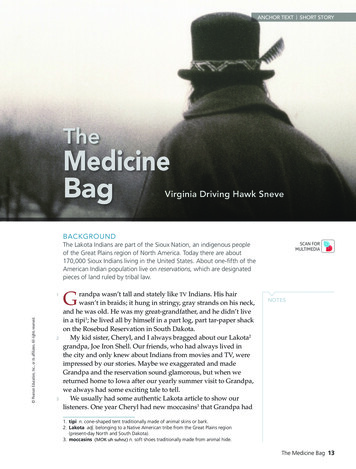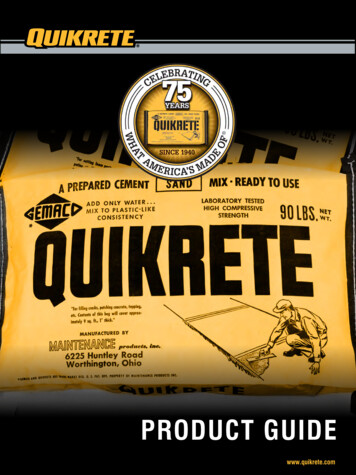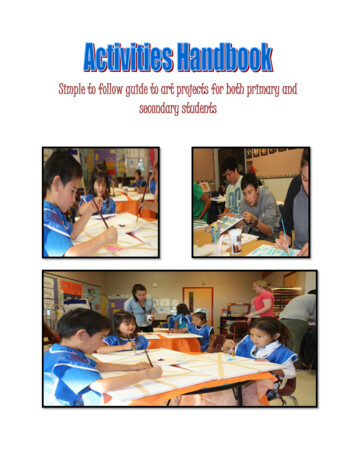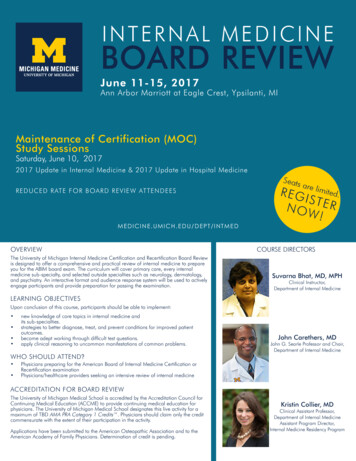
Transcription
ANCHOR TEXT SHORT STORYTheMedicineBagVirginia Driving Hawk SneveBACKGROUNDThe Lakota Indians are part of the Sioux Nation, an indigenous peopleof the Great Plains region of North America. Today there are about170,000 Sioux Indians living in the United States. About one-fifth of theAmerican Indian population live on reservations, which are designatedpieces of land ruled by tribal law. Pearson Education, Inc., or its affiliates. All rights reserved.123Grandpa wasn’t tall and stately like TV Indians. His hairwasn’t in braids; it hung in stringy, gray strands on his neck,and he was old. He was my great-grandfather, and he didn’t livein a tipi1; he lived all by himself in a part log, part tar-paper shackon the Rosebud Reservation in South Dakota.My kid sister, Cheryl, and I always bragged about our Lakota2grandpa, Joe Iron Shell. Our friends, who had always lived inthe city and only knew about Indians from movies and TV, wereimpressed by our stories. Maybe we exaggerated and madeGrandpa and the reservation sound glamorous, but when wereturned home to Iowa after our yearly summer visit to Grandpa,we always had some exciting tale to tell.We usually had some authentic Lakota article to show ourlisteners. One year Cheryl had new moccasins3 that Grandpa hadSCAN FORMULTIMEDIANOTES1. tipi n. cone-shaped tent traditionally made of animal skins or bark.2. Lakota adj. belonging to a Native American tribe from the Great Plains region(present-day North and South Dakota).3. moccasins (MOK uh suhnz) n. soft shoes traditionally made from animal hide.The Medicine Bag 13
45678wearily (WEER uh lee) adv.in a tired way9101112straggled (STRAG uhld) v.hung in messy strands14 UNIT 1 RITES OF PASSAGEmade. On another visit he gave me a small, round, flat rawhidedrum decorated with a painting of a warrior riding a horse. Hetaught me a Lakota chant to sing while I beat the drum with aleather-covered stick that had a feather on the end. Man that reallymade an impression.We never showed our friends Grandpa’s picture. Not that wewere ashamed of him but because we knew that the glamoroustales we told didn’t go with the real thing. Our friends would havelaughed, so when Grandpa came to visit us, I was so ashamed andembarrassed I could have died.There are a lot of yippy poodles and other fancy little dogs inour neighborhood, but they usually barked singly at the mailmanfrom the safety of their own yards. Now it sounded as if a wholepack of mutts were barking together in one place.I walked to the curb to see what the commotion was. Abouta block away I saw a crowd of little kids yelling, with the dogsyipping and growling around someone who was walking downthe middle of the street.I watched the group as it slowly came closer and saw that in thecenter of the strange procession was a man wearing a tall blackhat. He’d pause now and then to peer at something in his handand then at the houses on either side of the street. I felt cold andhot at the same time. I recognized the man. “Oh, no!” I whispered,“It’s Grandpa!”I stood on the curb, unable to move even though I wanted torun and hide. Then I got mad when I saw how the yippy dogswere growling and nipping at the old man’s baggy pant legs andhow wearily he poked them away with his cane. “Stupid mutts,”I said as I ran to rescue Grandpa.When I kicked and hollered at the dogs to get away, they puttheir tails between their legs and scattered. The kids ran to thecurb where they watched me and the old man.“Grandpa,” l said and reached for his beat-up old tin suitcasetied shut with a rope. But he set it down right in the street andshook my hand.“Hau, Takoza, Grandchild,” he greeted me formally in Lakota.All l could do was stand there with the whole neighborhoodwatching and shake the hand of the leather-brown old man. I sawhow his gray hair straggled from under his big black hat, whichhad a drooping feather in its crown. His rumpled black suit hunglike a sack over his stooped frame. As he shook my hand, his coatfell open to expose a bright red satin shirt with a beaded bolo tieunder the collar. His getup wasn’t out of place on the reservation,but it sure was here, and I wanted to sink right through thepavement. Pearson Education, Inc., or its affiliates. All rights reserved.NOTES
1314151617181920212223 Pearson Education, Inc., or its affiliates. All rights reserved.2425262728“Hi,” l muttered with my head down. I tried to pull my handaway when l felt his bony hand trembling and then looked upto see fatigue in his face. I felt like crying. I couldn’t think ofanything to say so I picked up Grandpa’s suitcase, took his arm,and guided him up the driveway to our house.Mom was standing on the steps. I don’t know how long she’dbeen watching, but her hand was over her mouth and she lookedas if she couldn’t believe what she saw. Then she ran to us.“Grandpa,” she gasped. “How in the world did you get here?”She checked her move to embrace Grandpa and l rememberedthat such a display of affection is unseemly to the Lakota andwould have embarrassed him.“Hau, Marie,” he said as he shook Mom’s hand. She smiled andtook his other arm.As we supported him up the steps, the door banged open andCheryl came bursting out of the house. She was all smiles and wasso obviously glad to see Grandpa that l was ashamed of how I felt.“Grandpa!” she yelled happily. “You came to see us!”Grandpa smiled, and Mom and I let go of him as he stretchedout his arms to my ten-year-old sister, who was still youngenough to be hugged.“Wicincila, little girl,” he greeted her and then collapsed.He had fainted. Mom and I carried him into her sewing room,where we had a spare bed.After we had Grandpa on the bed, Mom stood there patting hisshoulder. “You make Grandpa comfortable, Martin,” she decided,“while I call the doctor.”I reluctantly moved to the bed. I knew Grandpa wouldn’t wantto have Mom undress him, but I didn’t want to either. He was soskinny and frail that his coat slipped off easily. When I loosenedhis tie and opened his shirt collar, I felt a small leather pouch thathung from a thong around his neck. I left it alone and moved toremove his boots. The scuffed old cowboy boots were tight, andhe moaned as I put pressure on his legs to jerk them off.I put the boots on the floor and saw why they fit so tight. Eachone was stuffed with money. I looked at the bills that lined theboots and started to ask about them, but Grandpa’s eyes wereclosed again.Mom came back with a basin of water. “The doctor thinksGrandpa may be suffering from heat exhaustion,” she explainedas she bathed Grandpa’s face. Mom gave a big sigh, “Oh hinh,Martin. How do you suppose he got here?”We found out after the doctor’s visit. Grandpa was angrilysitting up in bed while Mom tried to feed him some soup.“Tonight you let Marie feed you, Grandpa,” said my dad, whohad gotten home from work. “You’re not really sick,” he said asNOTESfatigue (fuh TEEG) n.physical or mentalexhaustionCLOSE READANNOTATE: Mark detailsin paragraphs 12–13 and18–21 that show how thenarrator and Cheryl eachgreet Grandpa.QUESTION: Why are theirgreetings so different?CONCLUDE: What can youconclude about Martinand his sister by the waythey greet Grandpa?frail (frayl) adj. delicate;weakThe Medicine Bag 15
29sheepishly (SHEEP ihsh lee)adv. in an embarrassedwayCLOSE READ3031ANNOTATE: Note thelanguage the author usesin paragraphs 31–32 thatshows the difficulty ofGrandpa’s journey.QUESTION: Why does the32author provide so muchdetail about the journey?CONCLUDE: What can youconclude about Grandpafrom the journey he took?33343536373816 UNIT 1 RITES OF PASSAGEhe gently pushed Grandpa back against the pillows. “The doctorthinks you just got too tired and hot after your long trip.”Grandpa relaxed, and between sips of soup, he told us of hisjourney. Soon after we visited him, Grandpa decided that hewould like to see where his only living descendants lived andwhat our home was like. Besides, he admitted sheepishly, he waslonesome after we left.I knew that everybody felt as guilty as I did—especially Mom.Mom was all Grandpa had left. So even after she married my dad,who’s not an Indian, and after Cheryl and I were born, Mom madesure that every summer we spent a week with Grandpa.I never thought that Grandpa would be lonely after our visits,and none of us noticed how old and weak be had become. ButGrandpa knew, so he came to us. He had ridden on buses for twoand a half days. When he arrived in the city, tired and stiff fromsitting for so long, he set out walking to find us.He had stopped to rest on the steps of some buildingdowntown, and a policeman found him. The officer took Grandpato the city bus stop, waited until the bus came, and then toldthe driver to let Grandpa out at Bell View Drive. After Grandpagot off the bus, he started walking again. But he couldn’t seethe house numbers on the other side when he walked on thesidewalk, so he walked in the middle of the street. That’s when allthe little kids and dogs followed him.I knew everybody felt as bad as I did. Yet I was so proud ofthis eighty-six-year-old man who had never been away from thereservation but who had the courage to travel so far alone.“You found the money in my boots?” he asked Mom.“Martin did,” she answered and then scolded, “Grandpa, youshouldn’t have carried so much money. What if someone hadstolen it from you?”Grandpa laughed. “I would’ve known if anyone tried to takethe boots off my feet. The money is what I’ve saved for a longtime—a hundred dollars—for my funeral. But you take it now tobuy groceries so that I won’t be a burden to you while I am here.”“That won’t be necessary, Grandpa,” Dad said. “We arehonored to have you with us, and you will never be a burden. Iam only sorry that we never thought to bring you home with usthis summer and spare you the discomfort of a long bus trip.”Grandpa was pleased. “Thank you,” he answered. “But don’tfeel bad that you didn’t bring me with you, for I would not havecome then. It was not time.” He said this in such a way that no onecould argue with him. To Grandpa and the Lakota, he once toldme, a thing would be done when it was the right time to do it, andthat’s the way it was. Pearson Education, Inc., or its affiliates. All rights reserved.NOTES
NOTES394041 Pearson Education, Inc., or its affiliates. All rights reserved.42434445“Also,” Grandpa went on, looking at me. “I have come becauseit is soon time for Martin to have the medicine bag.”We all knew what that meant. Grandpa thought he was goingto die, and he had to follow the tradition of his family to pass themedicine bag, along with its history, to the oldest male child.“Even though the boy,” he said, still looking at me, “doesn’thave an Indian name, the medicine bag will be his.”I didn’t know what to say. I had the same hot and cold feelingthat I had when I first saw Grandpa in the street. The medicinebag was the dirty leather pouch I had found around his neck.“I could never wear it,” I almost said aloud. I thought of havingmy friends see it in gym class or at the swimming pool and couldimagine the smart things they would say. But I just swallowedhard and took a step toward the bed. I knew I would have totake it.But Grandpa was tired. “Not now, Martin,” he said waving hishand in dismissal. “It is not time. Now I will sleep.”So that’s how Grandpa came to be with us for two months. Myfriends kept asking to come see the old man, but I put them off. Itold myself that I didn’t want them laughing at Grandpa. But evenas I made excuses, I knew it wasn’t Grandpa I was afraid they’dlaugh at.Nothing bothered Cheryl about bringing her friends to seeGrandpa. Every day after school started, there’d be a crew ofgiggling little girls or round-eyed little boys crowded around theThe Medicine Bag 17
4647CLOSE READ48ANNOTATE: Mark detailsin paragraphs 50 and 51that describe Grandpa’sactions.QUESTION: What do theseactions suggest aboutGrandpa’s character?CONCLUDE: What isthe effect of readerslearning more aboutGrandpa at the sametime Martin does?49505152535455565718 UNIT 1 RITES OF PASSAGEold man on the porch, where he’d gotten in the habit of sittingevery afternoon.Grandpa smiled in his gentle way and patiently answered theirquestions, or he’d tell them stories of brave warriors, ghosts, andanimals, and the kids listened in awed silence. Those little guysthought Grandpa was great.Finally, one day after school, my friends came home with mebecause nothing I said stopped them. “We’re going to see the greatIndian of Bell View Drive,” said Hank, who was supposed to bemy best friend. “My brother has seen him three times so he oughtabe well enough to see us.”When we got to my house, Grandpa was sitting on the porch.He had on his red shirt, but today he also wore a fringed leathervest trimmed with beads. Instead of his usual cowboy boots,he had solidly beaded moccasins on his feet. Of course, he hadhis old black hat on—he was seldom without it. But it had beenbrushed, and the feather in the beaded headband was proudlyerect, its tip a bright white. His hair lay in silver strands over thered shirt collar.I stared just as my friends did, and I heard one of themmurmur, “‘Wow!”Grandpa looked up, and when his eyes met mine they twinkledas if he were laughing inside. He nodded to me, and my face gotall hot. I could tell that he had known all along I was afraid he’dembarrass me in front of my friends.“Hau, hoksilas, boys,” he greeted and held out his hand.My buddies passed in single file and shook his hand as Iintroduced them. They were so polite I almost laughed. “How,Grandpa,” and even a “How . . . do . . . you . . . do, sir.”“You look fine, Grandpa,” I said as the guys sat down.“Hanh, yes,” he agreed. “When I woke up this morning, itseemed the right time to dress in the good clothes. I knew that mygrandson would be bringing his friends.”“You guys want a soda or . . . ?” I offered, but no one answered.They were listening to Grandpa as he told how he’d killed thedeer from which his vest was made.Grandpa did most of the talking. I was proud of him andamazed at how respectfully quiet my friends were. Mom hadto chase them home at supper time. As they left, they shookGrandpa’s hand again and said to me, “Can we come back?”But after they left, Mom said, “no more visitors for a while,Martin. Grandpa won’t admit it, but his strength hasn’t returned.He likes having company, but it tires him.” Pearson Education, Inc., or its affiliates. All rights reserved.NOTES
585960616263 Pearson Education, Inc., or its affiliates. All rights reserved.6465That evening Grandpa called me to his room before he went tosleep. “Tomorrow,” he said, “when you come home, it will be timeto give you the medicine bag.”I felt a hard squeeze from where my heart is supposed to be andwas scared, but I answered, “OK, Grandpa.”All night I had weird dreams about thunder and lightning on ahigh hill. From a distance I heard the slow beat of a drum. WhenI woke up in the morning, I felt as if I hadn’t slept at all. At schoolit seemed as if the day would never end, and when it finally did, Iran home.Grandpa was in his room, sitting on the bed. The shades weredown, and the place was dim and cool. I sat on the floor in front ofGrandpa, but he didn’t even look at me. After what seemed a longtime, he spoke.“I sent your mother and sister away. What you will hear todayis only for your ears. What you will receive is only for yourhands.” He fell silent. I felt shivers down my back.“My father in his early manhood,” Grandpa began, “madea vision quest4 to find a spirit guide for his life. You cannotunderstand how it was in that time, when the great Teton Lakotawere first made to stay on the reservation. There was a strongneed for guidance from Wakantanka,5 the Great Spirit. But toomany of the young men were filled with despair and hatred. Theythought it was hopeless to search for a vision when the gloriouslife was gone and only the hated confines of a reservation layahead. But my father held to the old ways.“He carefully prepared for his quest with a purifying sweatbath, and then he went alone to a high butte6 top to fast andpray. After three days he received his sacred dream—in whichhe found, after long searching, the white man’s iron. He did notunderstand his vision of finding something belonging to the whitepeople, for in that time they were the enemy. When he came downfrom the butte to cleanse himself at the stream below, he found theremains of a campfire and broken shell of an iron kettle. This wasa sign that reinforced his dream. He took a piece of the iron forhis medicine bag, which he had made of elk skin years before, toprepare for his quest.“He returned to his village, where he told his dream to the wiseold men of the tribe. They gave him the name Iron Shell, but theydid not understand the meaning of the dream either. At first IronShell kept the piece of iron with him at all times and believed itgave him protection from the evils of those unhappy days.NOTESCLOSE READANNOTATE: Mark thedetails in paragraphs 59and 60 that show howMartin feels.QUESTION: Why mightthe author have chosen toinclude this information?CONCLUDE: What dothese details suggestabout Martin?4. vision quest n. in Native American cultures, a difficult search for spiritual guidance.5. Wakantanka (WAH kuhn tank uh) Lakota religion’s most important spirit—the creator ofthe world.6. butte (byoot) n. isolated mountaintop with steep sides.The Medicine Bag 19
CLOSE READANNOTATE: Markdetails the author usesin paragraph 66 thatdescribe Iron Shell’sexperience.QUESTION: Whatimportant informationdoes this passage reveal?CONCLUDE: What can youconclude about Grandpa’sbelief in fate and destiny?6768697071727374757677“Then a terrible thing happened to Iron Shell. He and severalother young men were taken from their homes by the soldiersand sent to a boarding school far from home. He was angry andlonesome for his parents and for the young girl he had wedbefore he was taken away. At first Iron Shell resisted the teachers’attempts to change him, and he did not try to learn. One dayit was his turn to work in the school’s blacksmith shop. As hewalked into the place, he knew that his medicine had brought himthere to learn and work with the white man’s iron.“Iron Shell became a blacksmith and worked at the trade whenhe returned to the reservation. All his life he treasured the medicinebag. When he was old and I was a man, he gave it to me.”Grandpa quit talking, and I stared in disbelief as he covered hisface with his hands. His shoulders shook with quiet sobs. I lookedaway until he began to speak again.“I kept the bag until my son, your mother’s father, was a manand had to leave us to fight in the war across the ocean. I gave himthe bag, for I believed it would protect him in battle, but he didnot take it with him. He was afraid he would lose it. He died in afaraway land.”Again Grandpa was still, and I felt his grief around me.“My son,” he went on after clearing his throat, “had no sons,only one daughter, your mother. So the medicine bag must bepassed to you.”He unbuttoned his shirt, pulled out the leather pouch, andlifted it over his head. He held it in his hand, turning it over andover as if memorizing how it looked.“In the bag,” he said, as he opened it and removed two objects,“is the broken shell of the iron kettle, a pebble from the butte, anda piece of the sacred sage.7” He held the pouch upside down andfine dust drifted out.“After the bag is yours you must put a piece of prairie sagewithin and never open it again until you pass it on to your son.”He replaced the pebble and the piece of iron and tied the bag.I stood up, somehow knowing I should. Grandpa slowly rosefrom the bed and stood upright in front of me holding the bagbefore my face. I closed my eyes and waited for him to slip it overmy head. But he spoke.“No, you need not wear it.” He placed the soft leather bagin my right hand and closed my other hand over it. “It wouldnot be right to wear it in this time and place where no onewill understand. Put it safely away until you are again on thereservation. Wear it then, when you replace the sacred sage.”Grandpa turned and sat again on the bed. Wearily he leaned hishead against the pillow. “Go,” he said. “I will sleep now.”7. sage (sayj) n. type of herb.20 UNIT 1 RITES OF PASSAGE Pearson Education, Inc., or its affiliates. All rights reserved.66NOTES
7879“Thank you, Grandpa,” I said softly and left with the bag in myhands.That night Mom and Dad took Grandpa to the hospital. Twoweeks later I stood alone on the lonely prairie of the reservationand put the sacred sage in my medicine bag. NOTESComprehension CheckComplete the following items after you finish your first read.1. What makes Grandpa sound glamorous to the narrator’s friends?2. What happens when Grandpa arrives at Martin’s house?3. Why does Grandpa want Martin to have the medicine bag? Pearson Education, Inc., or its affiliates. All rights reserved.4. What is in the medicine bag, and what does Martin add to it at the end of thestory?Notebook Write a three-sentence summary of “The Medicine Bag.”RESEARCHResearch to Clarify Choose at least one unfamiliar detail from the text. Briefly researchthat detail. In what way does the information you learned shed light on an aspect of thestory?Research to Explore Choose something that interested you from the text and formulatea research question.The Medicine Bag 21
Jan 22, 2018 · it is soon time for Martin to have the medicine bag.” medicine bag, along with its history, to the oldest male child. bag










